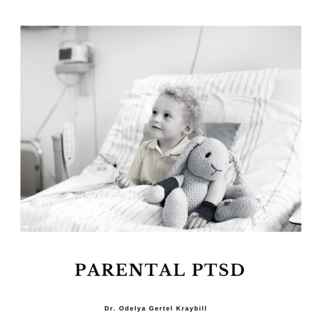Post-Traumatic Stress Disorder
Parental PTSD
The toll of caring for children with special needs.
Posted October 31, 2019 Reviewed by Ekua Hagan

I vividly remember the birth of my children. There were many people in the room: my husband, my OBGYN, a midwife, and two pediatricians to take my premature babies immediately away to the neonatal intensive care unit (NICU).
Things moved fast. I caught just a short glimpse of my firstborn before he was taken with my husband to the NICU. The focus was now on the second baby, and more people came into the room since he was smaller and showed signs of distress.
My second arrived a few minutes later and was quickly whisked away by another group of attendants. I waited with the midwife in the delivery room for an hour until I was allowed to go to the NICU to see them.
When I could finally meet my boys—now designated Baby A and Baby B — it was a very different moment than what I imagined for welcoming my children into the world.
They were so small and frail, so clearly not yet ready to be here. The sensors, wires, and gadgets attached to them amplified the feeling I had that I couldn’t yet engage them. We were not even able to hold Baby B for the first two days. Their care was managed by the hospital staff for the time we were in the hospital.
Shame and guilt enter the picture
I felt inadequate and guilty. What a disappointing way to welcome my children into life! I also felt overwhelmed with two. Who do I see first, hold first, feed first?
It was an intense, hectic, complex time. It seemed impossible to rest. We traveled every day to the hospital and spent many hours there. At night, I was anxious and slept poorly for months. My memories of that time are a blurry blend of being overjoyed with my wonderful twins and overwhelmed with the stress of coping.
In my memory, I framed the whole experience as positive and typical, because I am so grateful to have my boys. But 10 years later, two events made me realize how much I had gone through.
Not so typical after all
The first was when I babysat a baby infant and had him co-sleep with me, as I had done with my sons. Although I have never been a great sleeper, after my boys were born, I became a hyper-alert sleeper. I would awaken at every small noise. They needed to be fed every three hours and even when they were sleeping, I was often not resting well.
In this recent babysitting experience, I suddenly returned to a familiar memory of resting for an entire night without really sleeping. Only then did I realize how many years I really did not sleep well.
A second realization came when someone close to us shared her birth story. She described a slow, quiet process where things went as planned with only a midwife assisting. She held her baby in a quiet room for a few hours immediately after birth. As I heard this narrative, I realized for the first time how chaotic and stressful my birth experience had been and what an impact that must have had on all of us.
It is not that I had not heard similar stories from friends. But for the first time, this “typical” birth story triggered a strong stress response in my body. I felt that I was back in that strange place of joy at the birth of my twins, mixed with great chaos, uncertainty, and fear that something might go wrong. The memory was so strong I felt it throughout my body, as though I was back there again.
Trauma is common among parents
There are in fact a large number of parents who deal with stressful situations, whether traumatic pregnancy, delivery, or parenting a child with special needs or coping with chronic or life-threatening conditions. Despite how common this is, there is not a lot of information available about parenting and PTSD. Here’s a good post from 2018.
I work with many parents of children who suffer from developmental and complex trauma, many with chronic conditions that impact day-to-day life. The daily reality for such families is unpredictable, stressful, and often chaotic. This is a recipe for PTSD. Unfortunately, this danger is easy to overlook until serious stress symptoms take over and affect parents’ functioning.
Providing parental guidance and therapy to parents and often siblings is critical, not just for the benefit of my clients but for the wellbeing of the entire family. I urge parents to follow these reminders:
- Educate yourself about PTSD symptoms, how PTSD lays a deep hold on human functioning, and the effects of extreme stress. This knowledge will make it easier to see the many ways in which parenting in high-stress circumstances impacts parents with elements of trauma. This knowledge helps parents to recognize that the things they struggle with are common. It also makes it easier to cope and allow self-compassion instead of self-criticism.
- Acknowledge your PTSD for what it is. I find that clients almost always relax and feel less disturbed by their situation when they are able to do this. Definitions matter. It can be difficult and possibly painful to accept negative definitions such as trauma, loss, grief. It is not easy or fun to recognize you are going through difficulty. Denial is tempting. But by acknowledging the presence of difficult realities, you're more likely to find ways to cope and you will be present to your kids. At some point, these definitions help us take action to move beyond Withdrawal (stage 3 in the ETI Roadmap) towards trauma integration while learning to maintain sustainability.
- Get help. You may feel alone, as if this is only happening to you. It is not. Support groups, group therapy, and individual/family therapy are all valuable in helping to maintain stability and survive ongoing exposure to chronic stress. Finding support of this kind should be a high priority.
- Create a sustainability plan. Develop a set of routines that will help your ongoing sustenance, drawing upon the resources available to you and taking into account your vulnerabilities apparent from managing past and present stressors. If possible, get professional support in doing this—you’re more likely to recognize resources you may be overlooking and more likely to persist when you encounter wobbles.




